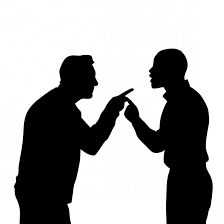Good counterarguments may slightly raise the chances of receiving a thoughtful response.
In the previous post I noted that we have evidence suggesting that people do not change their views, even in the face of compelling evidence and counterarguments. One response is to give up and not even bother. Moving on from someone’s rage can preserve our sanity.
A middle course is to imagine what kinds of counterarguments can be made that will raise the chances—if only slightly–of receiving a thoughtful hearing.
Having lived through another multi-year deluge of dubious ideas badly argued, it is good to pause and remember what a more thoughtful exchange of views should look like.

To begin, in any exchange we would expect contested assertions to be backed up by evidence or evident good reasons. A person interested in rattling off opinions with no reference to sound reasons or evidence is not worth your effort. Even in an informal conversation we expect to hear compelling support for claims. A judge or a responsible policy maker would expect tangible evidence. But it is true also our classrooms, where student debaters cannot simply offer unsubstantiated claims.
The basic unit of a counter-response is an argument. Its basic structure is simple and contains at least two parts: (1) An assertion or claim and (2) supporting evidence or good reasons. Those reasons may be widely honored values, or specific examples and–better yet–the testimony of experts who have a history of making accurate statements. The quality of supporting evidence increases the force of an argument.
The claim “the 2020 presidential election was free of fraud” is a common example. If I stop there in the presence of a MAGA true-believer, I am uttering a statement that—in formal terms—lacks “force.” To be sure, we are extremely happy to display our opinions like flags. They signal our attitudes and beliefs. But they have no power to bind doubters.

How can I meaningfully assert that the last election was fair and accurate? Where is my evidence? I ought to be able to supply it, and not—as the former President does with claims reworded to appear to be reasons. So, if I am making a claim, I ought to be able to put “because” after it and find that the reasons that follow will make sense: will sound right. Our example might unfold in the following sequence.
“The Election was free of fraud.”
Because. . .
- The Attorney General in the Trump Administration said so.
- The administration’s head of cyber-security said so.
- No state government found evidence of significant instances of fraud.
- Respected journalists covering the election found no significant evidence of a corrupted vote.
- A vast array of American courts could not evidence of vote tampering, except for a scattering of Trump supporters (i.e., some fake electoral college delegates).
To be sure, each of these assertions may need their own specifics or testimony. An example for the first claim could include Attorney General William Barr’s own words: “to date, we have not seen fraud on a scale that could have effected a different outcome in the election.” As testimony, Barr’s words are especially credible because he is (1) in a position to know, and (2) he is a “reluctant” source, meaning that Barr’s natural bias would be to support the views of the president who appointed him.
Arguments work best with truth claims. What can you do with your Uncle Fred’s assertion that he still “believes” some dead Democrats “voted” in 2020? You can ask him for evidence. But Fred may use the intellectual slight-of-hand of converting a belief into a claim of fact. That is dishonest, but telling him so probably will not keep him up at night. As we have noted before, you cannot usually do much about changing the fantasies that individuals need to believe them.
![]()


